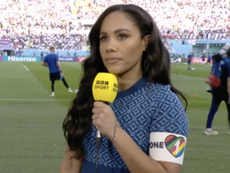Denmark coach Kasper Hjulmand questions Fifa over armband stance
Hjulmand spoke out after Euro 2020 semi-finalists Denmark were held 0-0 by Tunisia in their World Cup opener

Your support helps us to tell the story
From reproductive rights to climate change to Big Tech, The Independent is on the ground when the story is developing. Whether it's investigating the financials of Elon Musk's pro-Trump PAC or producing our latest documentary, 'The A Word', which shines a light on the American women fighting for reproductive rights, we know how important it is to parse out the facts from the messaging.
At such a critical moment in US history, we need reporters on the ground. Your donation allows us to keep sending journalists to speak to both sides of the story.
The Independent is trusted by Americans across the entire political spectrum. And unlike many other quality news outlets, we choose not to lock Americans out of our reporting and analysis with paywalls. We believe quality journalism should be available to everyone, paid for by those who can afford it.
Your support makes all the difference.Denmark football boss Kasper Hjulmand has questioned the ethical stance taken by Fifa over the ‘One Love’ captain’s armband controversy.
The seven European nations including the Danes, England and Wales – who had signed up to wear the rainbow-coloured armbands in Qatar confirmed they would no longer be worn due to fear of a yellow card being issued to their captains.
Hjulmand spoke out after Euro 2020 semi-finalists Denmark were held 0-0 by Tunisia in their World Cup opener.
“This is something that has been built up for a long time and now in the latest days this is where we are,” said Hjulmand.
“We have this slogan in Denmark, ‘Part of something bigger’ and now I’m sure I’m part of something I like. I love football and I love people, but it’s important to change direction.
“I hope a lot of young progressive people will enter governing bodies, thrive and do something great, and also that we show more empathy with each other. That’s maybe my two biggest dreams.”
Hjulmand admitted he found the entire situation surrounding the armband “difficult” as he prepared for Denmark’s first World Cup game.
He said: “I don’t if you can imagine how much focus goes on to the pitch at a World Cup – and how these players are affected.
“I have to protect my players, because the focus and amounts of energy you have to play with and where they are in their life, it’s not right to put on the players.
“It is enormously difficult to spend hours thinking about what actions you can take. I’m only talking about myself when I say I find the situation difficult right now.”
Wearing the anti-discrimination armband in Qatar, a country where same-sex relationships are criminalised, would have been an especially significant move and the seven FAs involved have faced criticism for backing down to Fifa on the issue.
Asked whether those countries should have accepted the sporting punishment to make a stand on diversity, Hjulmand said he did not know if the sanctions would stop at a booking.
He said: “I don’t know if it’s (just) a yellow card. We just know there will be consequences and football and results are part of it.
“It’s hard to tell about this. But this is standing up for diversity, this isn’t a political statement. Something that is really difficult and what we really value.”
Denmark captain Simon Kjaer wore the Fifa-approved ‘no discrimination’ armband against Tunisia instead, as England’s Harry Kane did against Iran on Monday.
Fifa has been heavily criticised over the matter. It only announced its plan for an approved armband on Saturday, and even then, it stated the ‘no discrimination’ part of its campaign would only begin at the quarter-final stage. On Monday that position shifted.
It followed a late U-turn on alcohol sales within stadium perimeters last Friday, and has again raised questions over who ultimately is in charge at this World Cup – Fifa or the Qatari authorities.
Belgium defender Jan Vertonghen said players were “being controlled” and were afraid to speak about anything while in Qatar for fear of disciplinary action.
“If you make a statement by wearing the armband that would mean punishing yourself,” the former Tottenham centre-back said ahead of his side’s opening World Cup match against Canada on Wednesday.
“I don’t feel comfortable, and that is telling enough. We are put on the spot, and I am afraid that if I say something about this, I might not be able to play (on Wednesday) and that is a situation I have never, ever experienced in football, and I hope I will never, ever have to experience again because it is not good.
“We are being controlled. I don’t like making political statements. We are here to play football, and if we can’t even do that because we are making a statement and just saying normal things, like ‘no to discrimination’ or ‘no to racism’, and you cannot say that, then hey, then what?
“I shouldn’t be saying anything about it because (on Wednesday) I want to appear for the kick-off at 10 o’clock so I will leave it at that, and that says enough.”



Join our commenting forum
Join thought-provoking conversations, follow other Independent readers and see their replies
Comments